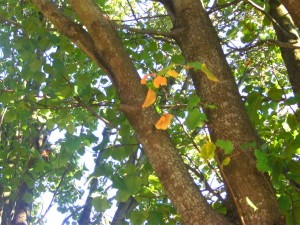Yes, she can.
Project Conversion relies on the kindness of strangers, people who volunteer their time and energy in teaching me the ways of their faith. These are called Mentors, however the community of believers otherwise known as the Congregation also lends their support. That said, should we limit our learning resources to only humans?
I’ve thought a lot about karma this month. No, I don’t have a particularly guilty conscious or insight into naughty behavior from a past life, but the Jain concept of karma is unique and deserves contemplation. Within Jain thought, karma isn’t merely a law of cause and effect that follows us into subsequent lifetimes, but a form of matter attracted to aversion and attachment. The goal of every Jain is the shedding of this karmic matter.
The tough part was visualizing this concept…until last evening.
Humans work well with metaphor and analogy. That’s why most of our religious texts are in the form of parables (don’t tell too many literalists that). Throughout my journey this year, nature has had a tendency to show me things about philosophy and spirituality that always blow my mind. The River Temple is a great example. In fact the last great lesson from the River Temple was so intense that I have not returned since September. Last evening’s demonstration was a bit more mild.
I sat on the front porch for evening meditation as I normally do. Usually I’ll select one of the 12 bhavanas (contemplations) to focus on, however this time I just wanted to empty my mind, do some noise housekeeping. Focusing on the breath, I fell into a rhythm of quite relaxation and clarity. Thoughts faded, feeling faded, equanimity sat on my cognitive doorstep. Then I heard a crackle in the silence.
Usually I’d ignore the sound, but I opened my eyes. A brown and orange leave gently swayed through the air as it fell from the bough of our Bradford pear tree and landed in a growing pile of leaves. I looked up at the tree and noticed all of the turning leaves…all the withering, dying leaves.
Satori, that brief moment of absolute clarity, is a wonderful experience. In that moment, I clearly understood karma, and all because of a leaf from a tree.
It goes something like this:
During the growing season, a tree takes nourishment from its surroundings. All season it reaches and reaches for the sun and draws water into its roots. Always striving, always reaching, always needing more in order to grow higher and fuller so that it might fulfill ever greater needs.
Once autumn approaches, the tree slows its cravings. The leaves turn gradually from a lush green to the fiery, multichromatic spray of reds, oranges, yellows and browns. Each one, a small factory of accumulation and desire, slowly shuts down and withers. Eventually the tree stops the accumulation altogether and the leaves, one by one, fall from the tree until there is nothing left but the skeletal branches. The tree is free of its burden until the next “life” or cycle of accumulation.
This is the nature of karma in Jain thought. Karma in this illustration are the leaves, and we are the tree itself. Once we inhibit our attachments and aversions, the karmic particles bound to our lives slowly wither and fall away. This is the Jain ideal, that we shed every leave so that we are free and our soul is liberated.
Obviously a tree’s leaves are essential for its survival and can hardly be equated with karma, so don’t get carried away with the analogy, but when I saw this happen in front of me everything regarding karma became clear.
Depending on your religious/spiritual disposition, nature may not play an important role in your life. I find it interesting that throughout the year, nature has always taught me something about faith, regardless of the month I’m studying. It’s worth noting that most of our religion’s founders often retreated into the wild just prior to their enlightenment or coming of age. Nature and experience then, is the supreme Mentor, because they teach within any context…if we are willing to pay attention.
When is the last time nature or experience offered you a moment of satori? Do you think nature has something to offer regarding spiritual and philosophical inquiry?


